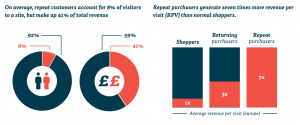Search engine optimization (SEO) is one of the most powerful digital marketing tools available to restaurant marketers today. It has the ability to dramatically increase website traffic, brand awareness, and sales. Unfortunately, restaurant marketers today have to navigate an industry filled with misunderstandings and myths, which make it difficult to separate fact from fiction. Marketers who have fallen victim to these myths are likely to waste time, energy, and eventually money through lost visibility and sales. The following 11 myths are common, but uncovering the truth to SEO success will help marketers succeed.
Myth #1: SEO No Longer Works
For more than a decade, pundits, reporters, marketing experts, and business owners have claimed that SEO is dying. However, evidence proves that SEO dramatically affects website traffic. As Google and other search engines update algorithms to prevent fraud, SEO simply evolves to fit the new standards. While less credible SEO tactics will not work going forward, digital marketers focusing on reputable and innovative techniques—all based on quality content and data-driven research—will continue to rocket up the rankings.
Myth #2: SEO Can Guarantee The No. 1 Position
Untrustworthy SEO companies sometimes guarantee the No. 1 position for target keywords. According to Google, no SEO company should make such a promise—in fact, it’s one of the abuses of SEO to look out for. SEO has the ability to move companies up in search engine rankings. For some companies that may mean moving to the No. 1 spot, but no SEO expert should promise a restaurant that it’ll rank first.
Myth #3: No Experience Is Necessary To Be an SEO Expert
Google uses more than 200 factors to determine keyword rankings, meaning a comprehensive SEO strategy is neither quick nor easy. When done correctly, SEO improves rankings and website traffic consistently over time. Restaurants that decide to invest in SEO should come in with the understanding that SEO takes patience—overnight results are not the norm.
Myth #4: Link-Building Is A Waste Of Resources
Link-building is one of the most effective strategies SEO experts use to positively impact search rankings. Just like the SEO industry as a whole, industry “experts” have deemed link-building dead multiple times. Search engine algorithms currently weed out spam links, unnatural links, and link networks created to game the system much faster and efficiently than ever before. Because of this, link-building has evolved into what exists today: an effective strategy that emphasizes relationship-building with authoritative publishers, quality content, and relevant links.
Myth #5: More Links Are ALWAYS Better
Today, link builders are putting the emphasis on creating quality content over quantity. Restaurants should focus on creating unique, quality content placed on authoritative and relevant websites, not on writing poor-quality blog posts that have little to no chance of being read or shared. In some instances, a single link from a highly read website with a high domain ranking can create more SEO value than multiple links from smaller, non-authoritative websites.
Myth #6: Guest-Blogging Is A Waste Of Time
Guest-blogging is an effective way for restaurant marketers to develop thought leadership. It was also considered one of the most popular and effective ways to build links until January, when Matt Cutts at Google took aim at guest-blogging networks created as an SEO go-around. Marketers can still create value by guest-blogging. However, marketers should use guest-blogging with a focus on creating quality content that users will want to read and share—not just for creating links.
Myth #7: Directory Citations Are All-Important For Local SEO
Directory syndication is one of the cornerstone strategies when it comes to local SEO. Nevertheless, some marketers have expanded the line of thinking into a popular myth that directory citations are all-important when it comes to local SEO. While directory citations and search engine listings do act as links, they alone will most likely not make a significant impact on search engine rankings and should be just one part of a comprehensive SEO strategy.
Myth #8: Mobile And Desktop SEO Users Are The Same
Simply put, because mobile and desktop users search for different things using different terms, optimizing for desktop searches is not the same as optimizing for mobile. New projections from eMarketer show that there will be more than 161 billion local searches in 2015, with more than half being on mobile devices. With mobile users more likely to search for different information than desktop searchers, search engines treat mobile searches differently. This means that the keyword research and content creation must be done for both mobile and desktop users to ensure that both sets of searchers find the information they’re looking for.
Myth #9: Local SEO Doesn’t Make A Difference
One mistake that many restaurant marketers make is conflating SEO with local SEO. A new report from Google shows that 4 out of 5 consumers use search engines to find local information. Additionally, more than 80 percent of consumers search for local information. Google’s research also shows that local searches lead to purchases, with nearly 20 percent of local smart phone searches leading to a purchase within a day, proving that optimizing for local specifically can have a dramatic impact on results.
Myth #10: Buying Google Ads Improves Rankings
Simply put, buying ads does not impact organic search engine rankings. This myth has existed for so long that Matt Cutts made an entire video debunking it. Cutts explained that Google does not give preferential treatment in any way to websites that buy advertising. Buying search engine ads can put a restaurant above organic rankings, but that is not the same as improving organic rankings.
Myth #11: Social Media Posts Directly Improve Search Rankings
There have been rumors about Google and other search engines using social signals as part of their algorithms. But, as of right now, Google says that shares, likes, and retweets do not impact organic search rankings. Restaurant marketers must recognize that social media marketing can be an important asset due to its ability to provide positive ROI, but it should not be counted on to directly impact search results.
Conclusion
Restaurants need SEO to improve digital visibility, brand awareness, and local foot traffic. Marketers that believe in the SEO myths listed above will see diminished results. However, by contacting a technology-driven SEO partner with extensive experience assisting restaurants with their SEO programs, marketers can maximize the potential benefits from SEO and avoid these commonly found pitfalls.
Digital & Social Articles on Business 2 Community
(356)
Report Post






